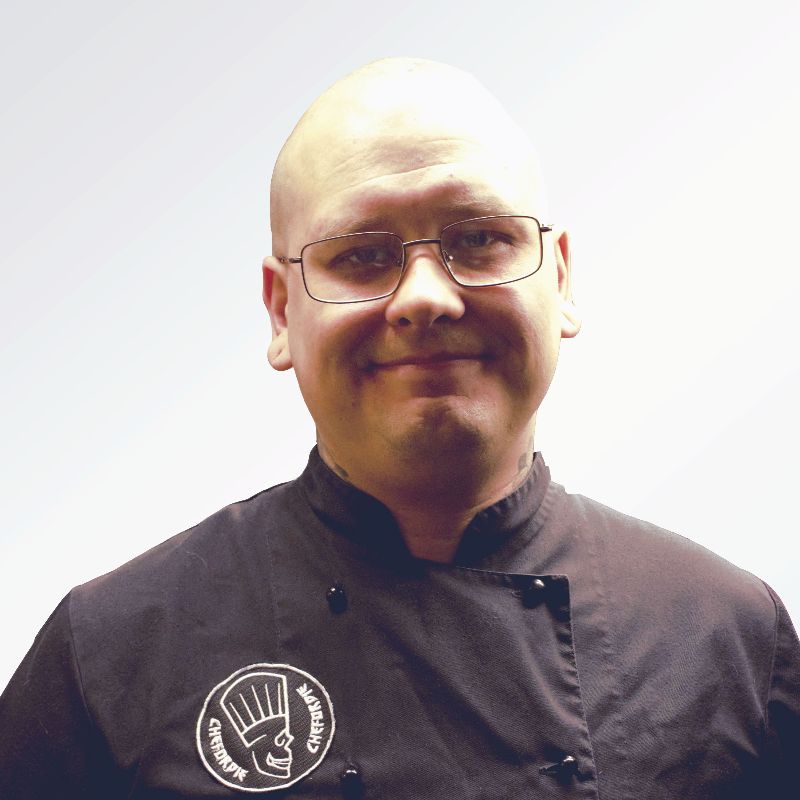Cook
“The best part about working as a cook are the days when it's controlled chaos in the kitchen. The evening rolls forward quickly but you are on top of things. Then you suddenly realize that the shift is over and high-five your colleagues. That’s the best part in this profession: at their best, the days just fly by.”

- Jukka Nieminen
- Cook in different restaurants through the Keikkakokki Oy manpower agency.
- Completed a vocational qualification in Restaurant and Catering Services at Hyria Education and graduated as a cook in 2016. Previously completed a further vocational qualification in Wood Processing (joiner) and worked in construction and in a ground cable factory.
- Four years of work experience in the field.
Briefly explain what you do for a living.
I am a professional cook and work in various restaurants in Southern Finland through the Keikkakokki manpower agency. In addition to traditional restaurants, I work at fairs and various events, such as summer festivals. Currently, I do mostly a ’la carte, which means that I prepare dishes from a menu. My responsibilities include preparing food and plating dishes.
How have you ended up in the profession of your choice?
I was working in a factory where the days felt long, and there wasn't much variation. My stepmother worked in the restaurant industry and graduated as a cook. Through her, I got excited about the profession, but I spent couple of years gathering courage to study a new career as an adult. Looking back, the work pace went up while the salary went down, but the days go much faster, and I enjoy going to work.
Describe your typical working day or week.
When I come to work, I turn on the machines and equipment needed for cooking and bring out the necessary ingredients. I then start the preparations and try to get as much done as possible, such as chopping salad ingredients or preparing the food as far as possible. My vocational school teacher said that the best cook is the one who makes the best preparations, and I think it’s accurate.
Then, I wait for the main event to begin. Not everyone understands how busy the kitchen can be at dinner time – you might not have time for a sip of water. Of course, some days are quieter. That’s when we clean up or do something else useful. The moments when there’s nothing to do are rare.
What kind of work environment or working hours do you work in?
In the restaurant industry, your working hours depend on whether you are making lunch or a ’la carte, like me. I usually work from 15.00 to 22.00 – often a bit later too.
My working environment is the kitchen. There is some variation in the form of events where I cook the meat for the customers on open fire. The work is physically tough as you must stand a lot, and I often walk over 20 000 steps a day.
It should be noted that asthma could bother a cook working in the kitchen, as you must work with dusty flour, for example.
What kind of competence or qualities are required in the profession?
The most important thing is to always do your best. You must have professional pride in what you do. You should be happy to eat every dish you put out. In other words, it's the attitude that counts – also in this line of work. The cook’s profession offers unlimited opportunities to develop, as there's always new flavours to try and different combinations to test.
What is the best thing about your profession?
The best part about working as a cook are the days when it's controlled chaos in the kitchen. The evening rolls forward quickly but you are on top of things. Then you suddenly realize that the shift is over and high-five your colleagues. That’s the best part in this profession: at their best, the days just fly by. Fairs and other events also offer pleasant variety. My dream for the coming spring is to visit Lapland for a couple of weeks and see what the cook’s work is like up there.
What are the downsides of the profession or what seems challenging?
Working as a cook requires stress tolerance and flexibility. If you haven't been able to take a break during a busy day, it is not the customer's fault. That’s when the cook must be flexible. You just need to remember that you get to have more breaks on the quieter days.
What would you tell a person considering the profession of a cook?
Working hours is something to think about. Cooks usually work when others are off-the-clock. For example, I often work on weekends. If you have children, you might have to choose tasks that suit your schedule. My friends often ask what we should do on the weekend, and I ask them what we should do on Wednesday when I have a day off.
It is also worth considering that you cannot just approach an employer with your CV and expect it to solve your fate. It is common to do a couple of test shifts first, which will determine if you are up to it.
My advice for those aiming for the field is to be bold and ask for an internship from high-quality restaurants. You should not be too modest, as you performing well will also be crucial in the future if the training works out.
How do you see the future of your profession?
The employment prospects in the industry seem bright. At the moment, there are more jobs than cooks, as many changed fields during the COVID pandemic. Before, you had to be quick to get shifts through a recruiting agency, but now, you have some room to choose.
